3 Differences Between a T-shirt Blanket and T-shirt Quilt.
Updated: July 15th, 2024 | Published: July 4th, 2022
5 min. read
By Andrea Funk
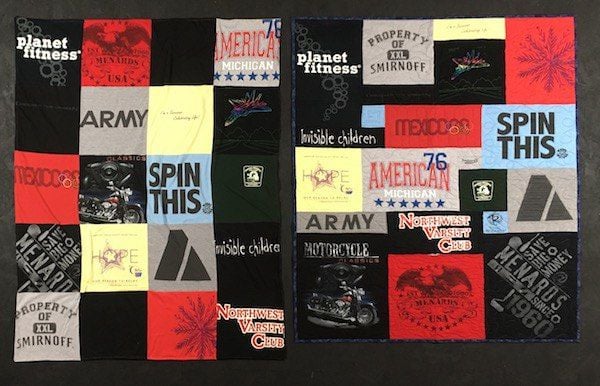
The Major Differences Between a T-shirt Blanket and a T-shirt Quilt
1. The numbers of layers
2. If and how these layers are or are not connected
3. The style of binding used to finish the quilt or blanket
A Quilt and a Blanket Are Not the Same Thing!
They both might keep you warm, but that’s where the similarities end. The differences between a quilt and a blanket impact cost, feel, and durability—important factors to consider before you decide which is right for you.
Project Repat Makes Blankets, Not Quilts – Know the Difference
If you’ve landed on this article, chances are you’re considering a Project Repat blanket, or a quilt made from T-shirts. But it’s crucial to understand: Project Repat does not make quilts—they make blankets.
In the photos below, the blanket is on the left, and the quilt is on the right. Both were made from the same pile of T-shirts, yet the results are completely different. Let’s explore why.
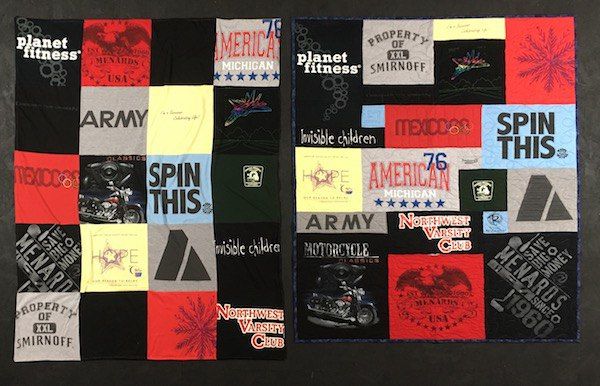
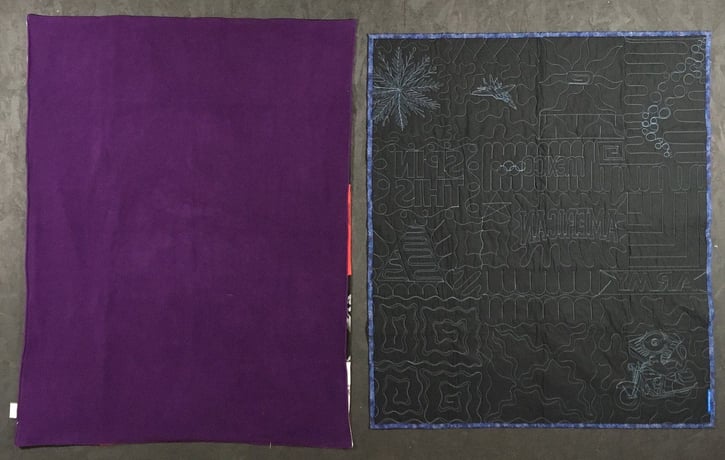
1. Number of Layers
Blanket
A blanket has two layers. The top layer is 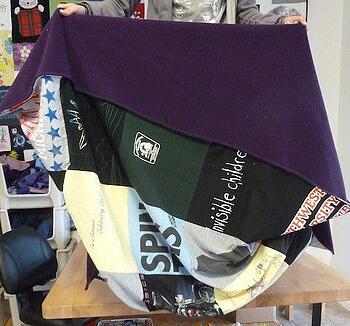 comprised of T-shirts. The second layer or the back layer is made out of fleece, flannel or some other fabric.
comprised of T-shirts. The second layer or the back layer is made out of fleece, flannel or some other fabric.
Cost: Only having two layers will immediately save the maker the cost of having the third layer.
Remember quilts always have three layers. The cost savings could be from $20 to $50 depending on the which batting was not used in the blanket.
Feel: A blanket typically will feel thinner than a quilt. This is because it it missing a layer of batting.
Durability: A blanket is less durable than a quilt - more why below.
Quilt
A quilt is made up of three layers.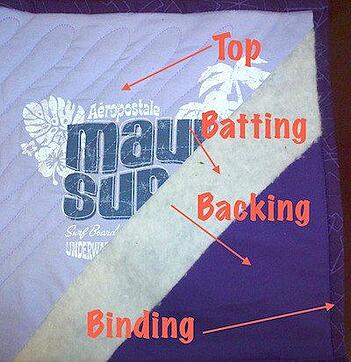
- The top layer of a T-shirt quilt is comprised of T-shirts.
- The middle layer is called the batting. Batting can be 100% polyester, 100% cotton or a mix of polyester and cotton. Batting can be thick or thin.
- The third layer of a quilt is called the backing. Backing material can be any number of different types of fabrics.
Click here to read more about backing material for T-shirt quilts.
Cost: Adding batting to a quilt will increase the cost of the quilt. The larger the quilt and the higher quality of batting, the more cost it will add to a quilt.
Feel: Adding batting to a quilt gives it a more solid feel than a blanket.
Durability: Batting adds to the durability of a quilt because pads the quilt. This means that there will be less wear between the front and back of the quilt.
2. Connecting the Layers
Blanket
 The two layers of a blanket are typically not connected. The front and the back can easily be pulled apart from one another.
The two layers of a blanket are typically not connected. The front and the back can easily be pulled apart from one another.
In the photo of a blanket above, we show how the back and front of a T-shirt blanket are not connected.
Cost: Not having to spend time and money connecting the front to the back will save a huge amount in time and labor. Blanket makers don't have to have the tools to connect the layers. A long-arm quilting machine with a good set up cost $20,000 to $30,000. Not to mention the skills to run the machine.
Feel: The front and back of the blanket will always be pulling apart. It will make a blanket feel messy.
Durability: Not having the two layers connected means that the layers will stretch out of place. The stretching is not good for the T-shirts or the seams holding them together. Also, the front or back may get snagged on something as you use it.
Quilt
The three layers of a quilt are held together 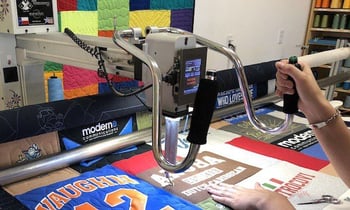 with the quilting. The term quilting covers a wide range of methods used to hold together the three layers of the quilt.
with the quilting. The term quilting covers a wide range of methods used to hold together the three layers of the quilt.
Cost: First, a quilt maker has to have the right equipment. As noted above, this set up could cost $20,000 to $30,000. This cost will be reflected in the cost of the quilt.
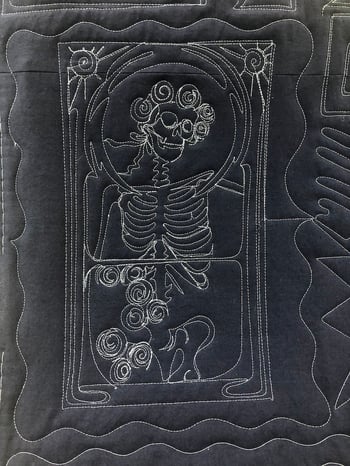 Second, it takes time to long-arm quilt a T-shirt quilt. Depending on the type of quilting done, this may add 6 to 8 hours to the time it takes to make a T-shirt quilt. This time will be reflected in the cost of a quilt.
Second, it takes time to long-arm quilt a T-shirt quilt. Depending on the type of quilting done, this may add 6 to 8 hours to the time it takes to make a T-shirt quilt. This time will be reflected in the cost of a quilt.
Feel: The quilting adds a nice texture to a quilt. A quilt will not squirm around on you. It will be solid.
Durability: The quilting adds to the durability of a quilt. It will keep the top, batting and backing from shifting around. It basically fixes the components of a quilt together.
Coolness: If a T-shirt quilt is quilted right, the coolness or awesomeness factor will go way up! Read more about awesome quilting here.
Planning a T-shirt quilt?
Here are step-by-step directions for ordering your Too Cool T-shirt quilt.
3. Type of Binding
A binding is the term used to describe how the raw 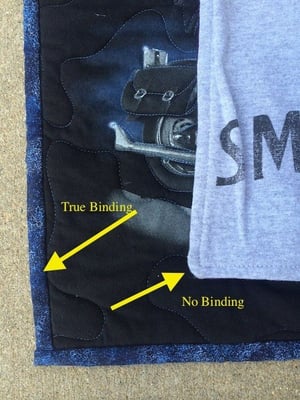 edge of a quilt or blanket is finished. Read more about the types of bindings here.
edge of a quilt or blanket is finished. Read more about the types of bindings here.
Blanket
Typically, blankets do not have bindings.
To finish a blanket, the quilter will place the face of the top to the face of the backing material. They then sews around the outside of the two pieces leaving about 8" unsewn. Through this hole, they will turn the blanket from inside out to good sides out. This is called a birthing or pillowcase method. It’s very quick and simple.
Cost: This method of finishing a blanket is simple. Thus any unskilled person could do this. Unskilled labor is always less expensive than skilled labor. Also, this is a quick process. Also a way to save cost.
Feel: This type of finishing will feel cheap. In the photo below is a close up of the edge of a blanket. You can see how it does not lay smooth. You can see the backing rolling over onto the front of the blanket.
Durability: This finish for a blanket should be durable.
Quilt
There are two typical methods u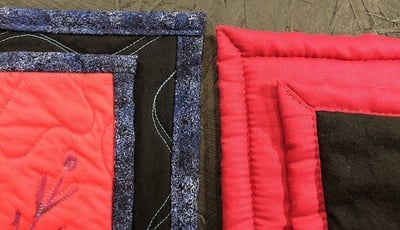 sed to bind a quilt.
sed to bind a quilt.
The first method is a half binding. In this method the backing material is folded around and sewn onto the front of the quilt. In the photo here, the half binding example is on the pink quilt on the right.
The second method is a traditional method where a separate piece of material is sewn around the perimeter of a quilt. This is the type of binding that we use here at Too Cool T-shirt quilts. In the photo here, the quilt on the left uses a traditional binding.
 Cost: A half binding will cost less than a traditional binding. This is because there is not an extra piece of material involved. But both styles of binding will take time and a skilled sewer. This will result is a higher cost product.
Cost: A half binding will cost less than a traditional binding. This is because there is not an extra piece of material involved. But both styles of binding will take time and a skilled sewer. This will result is a higher cost product.
Feel: A bound quilt will feel good. There is a tactile feel that this is the edge of the quilt. And it looks so much better.
Durability: A traditional binding will last longer than a half binding. This is because there is more material involved. Two layers of material will last longer than a single layer.
Click here to read more about the types of binding used for T-shirt quilts.
Conclusion:
Quality
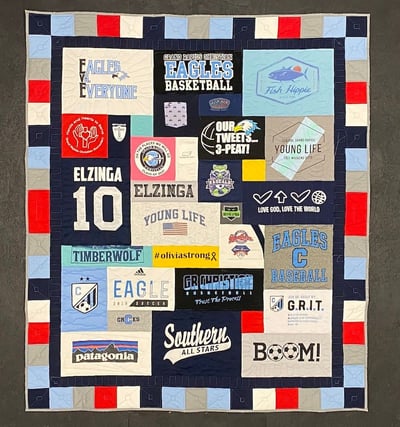 Blankets usually are low quality. This is because they lack quilting to hold their two layers together and the type of finishing used are quick and don't require a skilled sewer. A blanket can be well made, but by their nature, a blanket is a lower quality product than a quilt. Most quality quilt makers or companies do not make blankets, they make quilts.
Blankets usually are low quality. This is because they lack quilting to hold their two layers together and the type of finishing used are quick and don't require a skilled sewer. A blanket can be well made, but by their nature, a blanket is a lower quality product than a quilt. Most quality quilt makers or companies do not make blankets, they make quilts.
A quilt can be high or low quality depending upon how it’s made. Click here to read more about the quality variations in T-shirt quilts. But generally, a quilt is a higher quality product than a blanket because the three layers are attached and they are bound.
Cost
 A blanket will cost less than a quilt because there are fewer materials involved, they are fast and simple to make, a less skilled person can make one, and there is less equipment needed.
A blanket will cost less than a quilt because there are fewer materials involved, they are fast and simple to make, a less skilled person can make one, and there is less equipment needed.
A Quilt will be more expensive than a blanket because there are more materials involved, they are more complex, take longer to make, they require a skilled maker, and more equipment.
If you are planning to have a quilt or blanket made from your T-shirts, make sure you know which one is right for you!
Read more about how much a T-shirt quilt cost here.
Want to learn more about T-shirt quilts? Visit our Learning Center.
We have over 200 articles about all aspects of T-shirt quilts.

Andrea Funk is the inventor of T-shirt quilts made with multiple blocks sizes. The modern method of making T-shirt quilts. In 1992 she founded Too Cool T-shirt Quilts. Her life has been immersed in T-shirt quilts ever since.



